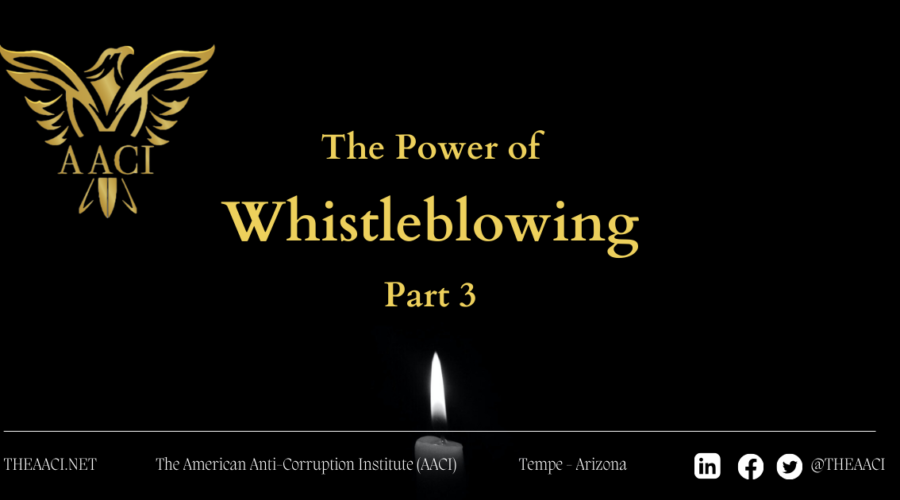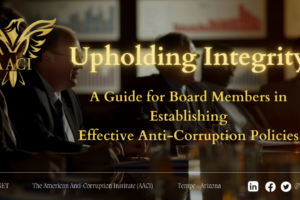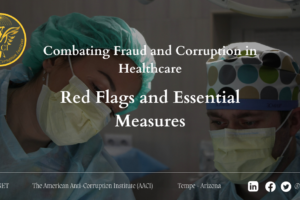Mike J. Masoud
September 4, 2023
Raising Awareness and Engagement of Citizens
This post marks the conclusion of a three-part series [1] [2] addressing the pivotal role of whistleblowing in deterring, preventing, and detecting instances of fraud, corruption, and abuse of power. It falls squarely upon the shoulders of governmental bodies and those entrusted with the responsibility of governance to actively involve citizens and various stakeholders in the battle against corruption. Encouraging individuals to blow the whistle when they identify, suspect, or foresee significant unlawful activities (as outlined in the definition of whistleblowing provided in part 1) is a fundamental aspect of this collective effort.
However, the effective engagement of citizens hinges on several critical factors, with the foremost importance being their comprehension of the whistleblowing concept. This comprehension encompasses understanding the nature of whistleblowing, the mechanisms involved, the attendant duties and rights, and the associated risks.
Raising Awareness
The leadership of any organization must possess a comprehensive understanding of whistleblowing and recognize its paramount significance in safeguarding the entity’s assets, mitigating the risk of fraud and corruption, and fortifying internal control and governance measures [3]. Moreover, when paired with establishing a robust ethical tone at the highest levels of leadership, it becomes imperative to clearly and transparently convey the organization’s unwavering commitment to effectively implementing its whistleblowing policy. In this endeavor, it is vital to acknowledge that employees play an essential role in the success and execution of this policy.
It is worth noting that employee responses to whistleblowing initiatives can vary significantly, contingent upon various factors. These factors include the prevailing organizational culture, adherence to social norms, the perceived integrity of leadership, legal safeguards, and incentive strategies. These variables collectively influence the quality and adequacy of employee responses to whistleblowing mechanisms.
Furthermore, it is incumbent upon the organization to conduct comprehensive training programs to enlighten senior management, departmental heads, and employees. Such programs are instrumental in ensuring that all stakeholders understand their respective roles and responsibilities while addressing any concerns or reservations regarding the whistleblowing process.
Engagement of Citizens
Citizens encompass elected and unelected public and private officials, senior management, employees, suppliers, vendors, regulators, and other stakeholders. Engagement entails conduct driven by adherence to laws, rules, regulations, culture, values, norms, and beliefs. When citizens are convinced their actions can combat corruption, they enthusiastically embrace leadership directives. Otherwise, proclamations will be met with skepticism. For instance, employees cognizant of corporate bribery to procure contracts will doubt executives proclaiming zero-tolerance anti-corruption policies.
Similarly, citizens observing no meaningful anti-corruption progress will be disinclined to participate. Authorities must cultivate environments where citizens feel empowered to fight corruption, matched by a demonstrated commitment to eradicating malfeasance. Tangible results build citizen trust and engagement.
Educate. Engage. Educate.
The sustained effort to combat corruption is a multifaceted, knowledge-driven, and long-term undertaking, the success of which depends on the active participation of citizens. Whistleblowing stands as a crucial pillar in this endeavor. Above all, the principles of citizenship and patriotism must remain central to any national anti-corruption strategy. Individuals entrusted with governance responsibilities across social, economic, and political institutions bear the onus of ensuring that comprehensive and regular anti-corruption education programs are accessible to their constituencies, with a concurrent emphasis on motivating them to become integral contributors to the fight against corruption.
Particularly, whistleblowing should assume a central role within these educational programs, both in theoretical instruction and through well-crafted case studies. For instance, a university’s leadership may organize seminars on whistleblowing for its faculty and students. Furthermore, it may initiate local campaigns to educate small business community leaders about whistleblowing and its profound significance in unearthing corruption at its nascent stages, among other advantages.
As early as 2014, the American Anti-Corruption Institute (AACI) recognized the importance of engaging students in the battle against corruption. Through collaboration with Qatar University, it established student chapters for The AACI. Presently, The AACI offers the Certified Anti-Corruption Fellow (CACF)[4] program, designed to educate and engage university students and executive management in preventing and deterring fraud and corruption. This initiative underscores the critical role that educational institutions and organizations play in cultivating a culture of integrity and actively combating corruption.






Conclusion
Whistleblowing plays a pivotal role in the fight against corruption, with statistics indicating that it contributes to the exposure of more than 50% of instances involving fraud and corruption. Consequently, any national or corporate anti-corruption strategy that does not prioritize a whistleblowing policy is flawed and destined for failure.
To ensure the efficacy of such strategies, the evaluation of elected and non-elected officials across all socio-economic institutions must encompass their performance in curbing corruption and reducing corruption levels to acceptable thresholds. However, an independent and competent third party [5] should assess their anti-corruption achievements, lending credibility and impartiality to the process. This independent evaluation is essential to instill confidence in the public and stakeholders, reinforcing the commitment to combating corruption at all levels of society and governance.
Sources and References
[1] The Power of Whistleblowing – Part 1, https://blog.theaaci.com/the-power-of-whistleblowing-part-1/ [2] The Power of Whistleblowing – Part 2, https://blog.theaaci.com/the-power-of-whistleblowing-part-2/ [3] The Certified Anti-Corruption Manager (CACM) management credential dedicates a unit to explain the definition, concept of whistleblowing, and its challenges. (Click here to read more about the CACM.)Exam Unit, “Whistleblowing,” Certified Anti-Corruption Manager (CACM) Review Textbook, 2023 ed. (United States of America: The Exam Unit of The American Anti-Corruption Institute LLC., January 12, 2023) pp. 530-553. [4] Exam Unit, Certified Anti-Corruption Fellow (CACF) Review Textbook, 2023 ed. (United States of America: The Exam Unit of The American Anti-Corruption Institute LLC., January 29, 2023). Read more https://www.theaaci.net/CACF [5] The American Anti-Corruption Institute (AACI) believes that certified public accountants are best positioned to opine on anti-corruption achievements following International Auditing and Assurance Standards Board, Handbook of International Quality Control, Auditing, Review, Other Assurance, and Related Services Pronouncements, 2021 Edition Volume II, International Standards on Related Services 4400 (Revised), Agreed-upon Procedures Engagements. https://www.iaasb.org/publications/2021-handbook-international-quality-control-auditing-review-other-assurance-and-related-services .Accessed on September 4, 2023.
Photo by Rahul: https://www.pexels.com/photo/lighted-candle-695644/











































